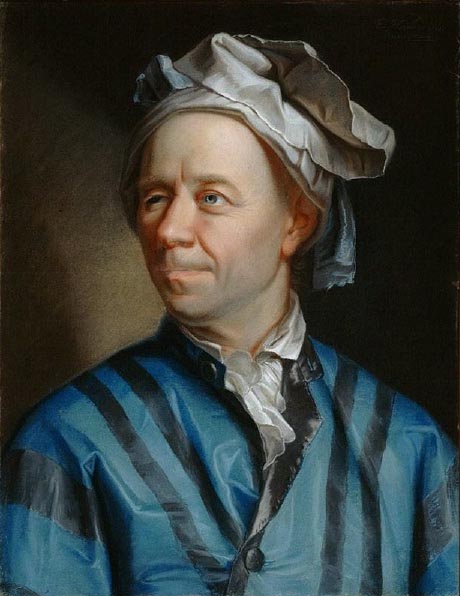
‘Leonhard Euler’, by Jakob Emanuel Handmann. 1753. Pastel on paper. (Kunstmuseum Basel, 1849, given by Rudolf Bischoff-Merian; source of image: Wikimedia Commons)
by Philip Beeley and Miranda Lewis
As a postscript to last week’s round-up of work in EMLO on mathematical correspondence, we would like very much to draw your attention to the latest volume of Leonhard Euler’s Opera Omnia. Edited by Martin Mattmüller and Franz Lemmermeyer, Leonhardi Euleri Opera Omnia vol. IVA 4: Commercium Epistolicum cum Christiano Goldbach — which is the first volume to appear in the ongoing series since 2004 — presents Euler’s correspondence with Prussian jurist and amateur mathematician Christian Goldbach (1690–1764).
Goldbach’s mathematical career can be said to have begun in Oxford. In 1712, while on a Grand Tour of Europe, he bumped into the Swiss mathematician Nicolaus I Bernoulli, also on European travels, in the Bodleian Library. When in discussion within those illustrious walls Goldbach declared he knew nothing of higher mathematics, Bernoulli lent him a book on infinite series by his uncle Jacob. After numerous false starts, Goldbach was able finally to establish himself as a mathematician and in 1725, then in Moscow, he began his epistolarly exchange with Euler. The new and comprehensively edited volume contains 196 letters, each one transcribed in the original language (either German or Latin) and supplemented with a full translation into English. The correspondence between the two mathematicians charts their lifelong friendship and spans more than thirty-five years. Their fascinating exchange offers an overview of eighteenth-century number theory, its sources, and its repercussions, as well as a glimpse into scholarly circles in St Petersburg and Berlin between the years 1725 and 1765, and, as it reconstructs the development of many of Euler’s most significant achievements, this volume will prove invaluable to mathematical historians around the globe.
For further details, and an order form, see here.
